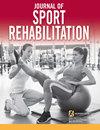日语运动员睡眠筛查问卷:适应性和验证研究
IF 1.3
4区 医学
Q3 REHABILITATION
引用次数: 0
摘要
背景针对运动员的一般筛查方法很有限。本研究旨在分析日文版运动员睡眠筛查问卷的信度和效度。自变量包括参与者的运动种类及其运动水平、年级(大一、大二、大三和大四)和年龄。问卷的可靠性采用克朗巴赫α和类内相关系数进行评估。对参加团体运动和个人运动的运动员进行了比较,以评估两者之间的差异。测试和重测的 Cronbach's alpha 分别为 0.34 和 0.44。类内相关系数显示了足够的内部一致性和重测有效性。测试和重测的平均睡眠困难分数分别为 7.0(2.3)和 6.5(2.1),但在个人和团体项目运动员之间未观察到显著差异。多变量回归分析结果显示,旅行期间的睡眠和表现问题与睡眠困难得分有关(Coef 1.44,P <.01)。日文版运动员睡眠筛查问卷已经过验证,具有足够的测试-再测试有效性,但内部一致性较差。因此,尽管日语版运动员睡眠筛查问卷是评估母语为日语的运动员睡眠障碍的合适问卷,但未来的研究仍需根据文化差异对问卷进行优化。本文章由计算机程序翻译,如有差异,请以英文原文为准。
Athlete Sleep Screening Questionnaire in Japanese: Adaptation and Validation Study.
CONTEXT
General screening methods for athletes are limited. This study aims to analyze the reliability and validity of the Japanese version of the athlete sleep screening questionnaire.
METHODS
In total, 111 female collegiate athletes completed the initial test and retest. The independent variables included the kind of sports of the participants and their athletic level, grade (freshman, sophomore, junior, and senior), and age. The reliability of the questionnaire was assessed using Cronbach's alpha and intraclass correlation coefficients. Athletes competing in team sports and individual sports were compared to evaluate for differences.
RESULTS
A total of 38.7% of athletes had moderate to severe sleep difficulty score. Their Cronbach's alpha for test and retest were .34 and .44, respectively. The intraclass correlation coefficient indicated sufficient internal consistency and test-retest validity. The mean sleep difficulty scores were 7.0 (2.3) and 6.5 (2.1) for test and retest, but no significant difference was observed between the individual and team sport athletes. Results of multivariable regression analysis revealed that having sleep and performance issues during travel was related to sleep difficulty scores (Coef 1.44, P < .01).
CONCLUSIONS
Athletes of all levels have sleep disorders. The Japanese version of athlete sleep screening questionnaire has been validated with sufficient test-retest validity but has poor internal consistency. Thus, although Japanese version of the athlete sleep screening questionnaire is an appropriate questionnaire for assessing sleep disorders in athletes whose primary language is Japanese, future research is needed to optimize the questionnaire accounting for cultural variation.
求助全文
通过发布文献求助,成功后即可免费获取论文全文。
去求助
来源期刊

Journal of Sport Rehabilitation
医学-康复医学
CiteScore
3.20
自引率
5.90%
发文量
143
审稿时长
>12 weeks
期刊介绍:
The Journal of Sport Rehabilitation (JSR) is your source for the latest peer-reviewed research in the field of sport rehabilitation. All members of the sports-medicine team will benefit from the wealth of important information in each issue. JSR is completely devoted to the rehabilitation of sport and exercise injuries, regardless of the age, gender, sport ability, level of fitness, or health status of the participant.
JSR publishes peer-reviewed original research, systematic reviews/meta-analyses, critically appraised topics (CATs), case studies/series, and technical reports that directly affect the management and rehabilitation of injuries incurred during sport-related activities, irrespective of the individual’s age, gender, sport ability, level of fitness, or health status. The journal is intended to provide an international, multidisciplinary forum to serve the needs of all members of the sports medicine team, including athletic trainers/therapists, sport physical therapists/physiotherapists, sports medicine physicians, and other health care and medical professionals.
 求助内容:
求助内容: 应助结果提醒方式:
应助结果提醒方式:


